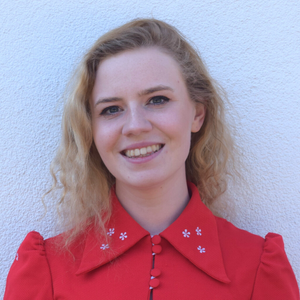Awards
 Promising Scientist Award
Promising Scientist Award
The Promising Scientist Award acknowledges those who have performed superior research in Posture and/or Gait early in their career. It entails a certificate as well as an amount of $1000 (USD) for travel expenses to attend the ISPGR World Congress.
The awardee is expected to give a 25 minute plenary presentation +5 minutes of questions at the ISPGR Congress. Priority will be given to young scientists with more established, independent careers with regular ISPGR status.
2022 Winner

Kaylena Ehgoetz Martens
University of Waterloo
Dr Ehgoetz Martens’ research combines movement kinematics, functional neuroimaging, psychophysiology and cognitive neuroscience to uncover the neural basis of gait and cognitive-emotional interactions in health and disease. In particular, she aims to (i) investigate the complex interactions between cognition, emotion, gait and balance; (ii) leverage the complexity of gait control to expose subclinical predictors of aging and neurodegeneration for translation to clinical practice, and (iii) combine gait with innovative technologies, such as virtual reality and mobile recording devices, to catalyze early diagnosis, prevent gait disturbances and falls, and preserve mobility throughout the lifespan. This information can lead to improved strategies to better assess and manage gait disturbances and falls in older adults and individuals at risk and/or suffering from neurodegenerative diseases.
Requirements:
- be an ISPGR member in good standing
- must have been awarded a PhD at the time of submission
- be no more than six (6) years post PhD degree on January 1st 2019 (documented parental/sick leaves will be taken into consideration)
- submit all required supporting documentation listed below before the submission deadline
Supporting Documentation
Prior to the application submission deadline, each candidate must:
- submit her/his/their full curriculum vitae
- submit up to three 1st author papers (pdf format)
- provide an interpretative summary (one 8” x 11” page limit) describing their research contribution to the field of Posture and Gait including a statement on the impact (clinical/translational/scientific) of their work and their level of independence
- Documentation of dates and duration of leave(s), if applicable
Award submissions are open from October 1, 2018 – January 11, 2019. Please submit required documentation via email to ispgr@ispgr.org
Past Winners
2015 Seville, Spain: Melvyn Roerdink, MOVE Research Institute, The Netherlands
2014 Vancouver, Canada: Ross Clark, Australian Catholic University, Australia
2013 Akita, Japan: Alain Frigon, Universite de Sherbooke, Canada
2012 Trondheim, Norway: Dan Marigold, Simon Fraser University, Canada
 Emerging Scientist Award
Emerging Scientist Award
The Emerging Scientist award acknowledges those who have performed superior research in Posture and/or Gait early in their career. It entails a certificate as well as an amount of $1000 (USD) for travel expenses to attend the ISPGR World Congress.
The awardee is expected to give a 15 minute plenary presentation +5 minutes of questions at the ISPGR Congress.
2022 Winner

Ríona Mc Ardle
Newcastle University
Dr Ríona Mc Ardle is an NIHR Advanced Fellow at Newcastle University, UK. Ríona aims to improve diagnosis and care for people with dementia though novel applications of digital mobility monitoring. With a background in applied neuropsychology, she brings a unique perspective to understanding mobility in dementia by bridging psychology, mobility and translational clinical research. She completed her PhD with the Brain and Movement Research Group (Newcastle University) in 2019, where she demonstrated that different dementia subtypes have unique signatures of gait impairment in the lab and real world which may support differential diagnosis (GaitDem study). Her post-doc work with the EDoN Initiative explored the acceptability and feasibility of using digital technology in people with cognitive impairment, carers, and healthcare workers for dementia screening. Given the significant research efforts to promote earlier dementia diagnosis, Ríona became interested in improving care for people following their dementia diagnosis. This led to her NIHR research fellowship, which aims to identify psychosocial predictors of physical activity loss in dementia so she can develop an intervention to support people with dementia to remain independent and physically active for longer following diagnosis. Ríona is passionate about public patient involvement and engagement with research and was awarded Newcastle University’s 2020 Tilly Hale Award for her efforts. She works to support early career researchers working in the dementia, digital technology and mobility fields through her roles as Head of Content, Policy and Research for the World Young Leaders in Dementia, and as the Dementia Deep Phenotyping North Regional Lead.
Requirements:
- be an ISPGR member in good standing
- must have been awarded a PhD at the time of submission
- be no more than three (3) years post PhD degree on January 1st 2019 (documented parental/sick leaves will be taken into consideration)
- submit all required supporting documentation listed below before the submission deadline
Supporting Documentation
Prior to the application submission deadline, each candidate must:
- submit her/his/their full curriculum vitae
- submit up to three 1st author papers (pdf format)
- provide an interpretative summary (one 8” x 11” page limit) describing their research contribution to the field of Posture and Gait including a statement on the impact (clinical/translational/scientific) of their work
- Documentation of dates and duration of leave(s), if applicable
Award submissions are open from October 1, 2018 – January 11, 2019. Please submit required documentation via email to ispgr@ispgr.org
Past Winners
 Best Talk and best poster awards
Best Talk and best poster awards
Best Poster Award for Postdoctoral Fellows
- creativity and originality of research
- clarity of presentation
- level of understanding
REQUIREMENTS:
To be eligible for the award, a candidate must:
- be an ISPGR post-doc member in good standing
- present a poster presentation to the award reviewers (may be anonymous)
Note: The Best Poster Award for post-docs is for poster presentations only. If you apply for and are selected for an oral presentation, you are not eligible for the poster award but will be in contention for the Best Talk Award. Winners will be announced onsite at the World Congress.
Past Winners
Basic Science
Hendrik Reimann, Temple University
“Phase-dependency of the balance response to Galvanic vestibular stimulation during walking”
Clinical Science
Lisa Alcock, Newcastle University Institute for Ageing
“Effect of obstacle contrast on visual behaviour in Parkinson’s disease”
Honourable Mention:
Basic Science
Douglas Martini, Oregon Health and Science University
“The interaction of cholinergic activity, gait, balance, and attention in mild cognitive impairment”
Best talk by a trainee award
- creativity and originality of research
- clarity of presentation
- level of understanding
REQUIREMENTS:
To be eligible for the award, a candidate must:
- be an ISPGR student/post doc member in good standing
- present an oral presentation at the World Congress to the award reviewers
Note: The Best Talk Award by a Trainee is for ISPGR student or post doctoral member oral presentations only. The winner will be announced onsite at the World Congress.
Past Winners
“Learning to balance on a slackline: Kinematic and spinal reflex adaptations”
Aftab Patla Innovation Award
Supported in part by Northern Digital, Inc and ISPGR. The ISPGR Awards Committee will offer two student poster presentation awards in honour of Dr. Aftab Patla. One award will be for basic science and one for clinical science. Recipients will be chosen from a panel of researchers based on several criteria including:
- creativity and originality of research
- clarity of presentation
- level of understanding
Requirements
- be an ISPGR student member in good standing
- present a poster presentation to the award reviewers (may be anonymous)
Note: The Aftab Patla Innovation Award is for student poster submissions only. If you apply for and are selected for an oral presentation, you are not eligible for a poster award but will be in contention for the Best Talk Award. Winners will be announced onsite at the World Congress.
Past Winners
Basic Science
Hikaru Yokoyama, The University of Tokyo
“Cortical processing underlying split-belt treadmill gait adaptation: an EEG study”
Clinical Science
Savitha Subramaniam, UIC
“Dance for Stroke: A virtual-reality dance based exercise to increase cardiovascular fitness and community ambulation in individuals with chronic stroke: A preliminary study”
Honourable Mentions:
Basic Science
Stuart Mackenzie, University of Birmingham
“Differential Effects of Vision Upon the Accuracy and Precision of Vestibular-Evoked Balance Responses”
Trina Mitchell, McGIll University
“Comparison of the neural correlates of complex walking in healthy young adults and middle-aged adults during real locomotion”
Clinical Science
Alberto Fung, University of Houston
“Smarter Balance System: Smartphone-based biofeedback technology for clinical and/or home-based balance rehabilitation”
2015 Seville, Spain
Aftab Patla Award Clinical Science
Winner: Niklas Lofgren – ‘Construct Validity of the Mini-BESTest in mild to moderate Parkinson’s Disease’
Honorable Mention: Julian Luppo – ‘Perceived Timing of Auditory and Inertial Cues During a Fall’
Honorable Mention: Jennifer Wong – ‘The impact of falls on functional recovery after discharge from in-patient stroke rehabilitation’
Aftab Patla Award Basic Science
Winner : Aurelie Fontan – ‘Cerebral network subtending proprioceptive processing in children from 7 to 10 years’
Honorable Mention: Whitney Cole – ‘Bouts of Steps: The Organization of Infant Walking’
Honorable Mention: Eric Beck – ‘Gaze behaviour in freezers may relieve processing demands’
2014 Vancouver, Canada
Aftab Patla Award Clinical Science: Courtney Pollock, University of British Columbia, Canada for the poster ‘Anticipatory postural reactions and arousal state during external perturbations are altered in people with stroke’
Aftab Patla Award Basic Science: Zoe Miranda, Université de Montréal, Canada for the poster ‘Presynaptic control of balance in healthy subjects’
2013 Akita, Japan
Aftab Patla Award Clinical Science: Hideki Nakano, Kio University, Japan for the poster ‘Effect of a plantar perceptual learning task on walking stability in the elderly; a randomised control trial’
Aftab Patla Award Basic Science: Taku Kitamura, Shibaura Institute of Technology, Japan for the poster ‘Phase modulation of corticospinal excitability for forearm muscle during voluntary leg stepping’
2012 Trondheim, Norway
Aftab Patla Award Clinical Science: Takashi Yoshida, University of Toronto, Canada for the poster ‘Cardiovascular response of individuals with spinal cord injury to dynamic functional electrical stimulation under orthostatic stress’
Aftab Patla Award Basic Science: Anahid Saradjian, Laboratory of Neurobiology and Cognition, France for the poster ‘Facilitation of somatosensory potentials depends on the balance constraints during motor preparation of a step: A microgravity and normogravity study’
2009 Bologna, Italy
Aftab Patla Award Clinical Science: Michael Schwenk, University of Heidelberg, Germany for the poster ‘Dual task performance can be improved in patients with dementia’
Aftab Patla Award Basic Science: Chantelle Murnaghan, University of British Columbia, Canada for the poster ‘Feedback during COM stabilization does not prevent exploratory COP behavior during upright stance’
 Travel Stipends
Travel Stipends
ISPGR is pleased to announce travel stipends will be available for ISPGR trainee members (students and post-docs) who are presenting an oral or poster presentation at the ISPGR World Congress. Further details about the amounts, application process and deadlines will be announced at the appropriate times.
Past Winners
Desiderio Cano Porras, Sheba Medical Center
“Gait adaptation to conflictive visual flow in virtual environments”
David Conradsson, McGill University
“Dynamic stability limits during walking turns in Parkinson’s disease”
Milou Coppens, Radboud University Medical Center
“The effects of transcranial direct current stimulation on gait initiation in people after stroke”
Moria Dagan, Tel Aviv University
“Potential of non-invasive brain stimulation to ameliorate freezing of gait in Parkinson’s disease: A deep repetitive TMS randomized, double-blinded, cross-over pilot study”
Kimberly Lang, Emory University
“Antagonist muscle activity in postural responses to support-surface translations in exercise-study-eligible people with Parkinson’s disease and neurotypical older adults”
